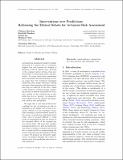| dc.contributor.author | Barabas, Chelsea | |
| dc.contributor.author | Dinakar, Karthik | |
| dc.contributor.author | Ito, Joichi | |
| dc.contributor.author | Virza, Madars | |
| dc.contributor.author | Zittrain, Jonathan L. | |
| dc.date.accessioned | 2018-07-15T10:55:01Z | |
| dc.date.available | 2018-07-15T10:55:01Z | |
| dc.date.issued | 2017 | |
| dc.identifier.uri | https://arxiv.org/abs/1712.08238 | |
| dc.identifier.uri | http://hdl.handle.net/1721.1/116995 | |
| dc.description | Part of the Humanizing AI in LAW (HAL) project. | en_US |
| dc.description.abstract | Actuarial risk assessments might be unduly perceived as a neutral way to counteract implicit bias and increase the fairness of decisions made at almost every juncture of the criminal justice system, from pretrial release to sentencing, parole and probation. In recent times these assessments have come under increased scrutiny, as critics claim that the statistical techniques underlying them might reproduce existing patterns of discrimination and historical biases that are re ected in the data. Much of this debate is centered around competing notions of fairness and predictive accuracy, resting on the contested use of variables that act as "proxies" for characteristics legally protected against discrimination, such as race and gender.
We argue that a core ethical debate surrounding the use of regression in risk assessments is not simply one of bias or accuracy. Rather, it's one of purpose. If machine learning is operationalized merely in the service of predicting individual future crime, then it becomes difficult to break cycles of criminalization that are driven by the iatrogenic effects of the criminal justice system itself. We posit that machine learning should not be used for prediction, but rather to surface covariates that are fed into a causal model for understanding the social, structural and psychological drivers of crime. We propose an alternative application of machine learning and causal inference away from predicting risk scores to risk mitigation. | en_US |
| dc.language.iso | en_US | en_US |
| dc.publisher | Proceedings of Machine Learning Research | en_US |
| dc.rights | Attribution 3.0 United States | * |
| dc.rights.uri | http://creativecommons.org/licenses/by/3.0/us/ | * |
| dc.subject | causal inference, criminal justice, interventions, risk assessment tools | en_US |
| dc.title | Interventions over Predictions: Reframing the Ethical Debate for Actuarial Risk Assessment | en_US |
| dc.type | Article | en_US |
| dc.identifier.citation | Barabas, C., Dinakar, K., Ito, J., Virza, M., & Zittrain, J. (2017). Interventions over predictions: Reframing the ethical debate for actuarial risk assessment. | en_US |
| dc.contributor.department | Massachusetts Institute of Technology. Media Laboratory | |
